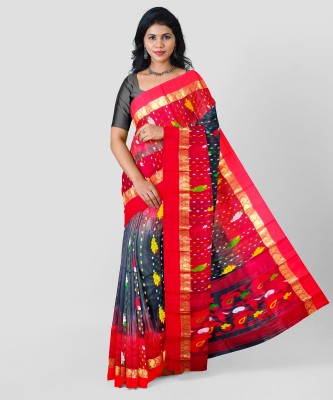APARNA COLLECTIONS Woven Jamdani Handloom Pure Cotton Saree(Black, Red)
Quick Overview
Product Price Comparison
Jamdani is an enduring craft; its specialism lies in the ability to integrate new techniques. From contrasting monotones of white-on-white, its palette has expanded into colourful, vibrant forms. While Jamdani began as cotton muslin, its weaves have incorporated threads of silk, silver, gold and more to create fascinating iterations. Today, Jamdani is done on various materials, without involving machinery.This art has travelled far beyond its birthplaceŌĆöDhaka, Bangladesh The skill of our weavers (over 70 per cent of whom are women), have the mastery to weave any pattern, no matter how intricate it is. Yet, like true artists, they keep pushing their craft.It is a national heritage and preserving the national heritage is a responsibility. The Indian Jamdani weave form has enormous potential to make our traditional fabrics and design gain global appeal. The weavers in recent years have discovered that it is the only weaving technique with a sustainability factor. They have also found that this technique has given them enormous scope to bring about artisanal diversity.The handlooms have always enjoyed the prominent place in the fashion world as the most enduring, comforting and body friendly fabrics. As we move into an age of eco-friendliness, it has become even more relevant to preserve these ancient traditions that have eco infused in every step. A Jamdani weaver can have between 100 and 300 different discontinuous weft threads laid out before her as she weaves. She picks the right thread and interweaves each weft by hand through thousands of warp threads. On a usual day, an artisan weaves between a quarter and one inch of fabric. This means a weaver could spend more than a year weaving one Jamdani sari. Largely, it depends on the intricacy and density of the design. That said, a sari takes anywhere between six months to three years to weave, where a pair of weavers weave for 10 hours a day.


